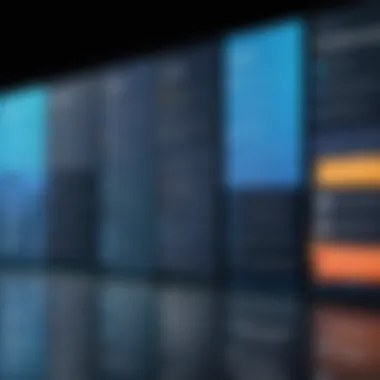Top Software Solutions for Effective Property Management


Intro
In the realm of property management, selecting the right software can significantly influence operational efficiency. As the landscape of property management evolves, software solutions have developed to become more sophisticated, enabling property managers to handle challenges more effectively. Understanding these tools is crucial for those looking to enhance their productivity, save time, and streamline processes.
Property managers are often tasked with juggling multiple responsibilities, from tenant relations to maintenance management. The right software can aid in automating routine tasks, allowing managers to focus on strategic aspects of property oversight. This article delves into the leading software options tailored for property management, examining essential features, user experiences, and industry trends.
Ultimately, the goal is to provide insights that allow property managers to make informed decisions tailored to their operational needs and improvement aspirations. Let's explore the key features that define the top software solutions available today.
Understanding the Role of Software in Property Management
In the evolving field of property management, software plays a vital role in enhancing operational efficiency. Property managers face numerous challenges, from tenant communication to maintenance requests. Utilizing effective software solutions can streamline these processes.
The ideal property management software simplifies various tasks, allowing managers to focus on core responsibilities. It can reduce manual errors, save time, and lead to overall improvements in service delivery. This transformation is essential for meeting the demands of modern tenants who expect prompt responses and effective communication.
Moreover, software solutions enable property managers to keep better track of finances, including rent payments and maintenance expenses. The integration of financial reporting tools can reveal insights and help with forecasting, which assists in better decision-making.
Investing in suitable software can lead directly to enhanced tenant satisfaction, which is crucial in a competitive real estate market. The right software can act as a backbone, supporting daily operations and potentially increasing property value. By understanding the importance of software in property management, one can navigate the complexities of selecting the right tools for their needs.
Defining Property Management Software
Property management software refers to digital tools designed to help property managers oversee their activities effectively. Such software aids in maintaining properties, managing tenants, and automating various administrative tasks.
This type of software can include both cloud-based and on-premise solutions, allowing for flexibility in operations. As property managers continue to adopt technology, the definition of property management software expands to encompass systems that integrate smart home technology and enhanced reporting features. Moreover, understanding its scope helps property managers assess what particular functionalities they might need or want.
Key Functions and Features
The functions and features of property management software are pivotal to its effectiveness. Here are some essential capabilities:
- Tenant Management: Software allows for efficient organization of tenant information, including leases, payment histories, and communication records.
- Accounting Tools: These tools provide comprehensive financial management, helping track income and expenses. They often feature invoicing options, payment processing, and financial report generation.
- Maintenance Management: Enables tenants to report issues quickly. Property managers can assign tasks to maintenance staff, track progress, and document resolutions.
- Reporting and Analytics: Provides insights into various metrics such as occupancy rates, cash flow, and tenant turnover, assisting property managers in making informed decisions.
- Document Storage: Secure storage for digital copies of important documents, including leases and insurance records, streamlines access and avoids physical clutter.
Understanding these functions can significantly enhance how property managers operate, leading to more organized and efficient management of their properties.
The Impact of Software on Property Management Operations
The role of software in property management has grown significantly in recent years. As the industry adapts to new challenges and opportunities, property management software has emerged as a key tool to enhance operational efficiencies. The integration of software solutions into everyday tasks allows property managers to navigate their responsibilities with greater precision and effectiveness. This section focuses on several crucial elements that illustrate the profound impact software can have on operations within property management.
Streamlining Operations
Streamlining operations is one of the primary benefits that software offers to property managers. Traditionally, managing properties involved numerous manual tasks that could be time-consuming and prone to error. With the advent of sophisticated software solutions, property managers can automate a wide range of processes. For instance, tasks such as rent collection, maintenance requests, and tenant communications can be managed with just a few clicks. This automation not only saves time but also reduces the risk of human error, allowing managers to focus on more strategic aspects of their role.
Another aspect of streamlining is the centralization of information. Property management software usually features a centralized database where all relevant information is stored. This features means that managers no longer need to search through physical files or various systems to find needed documents. Instead, they can instantly access tenant records, lease agreements, and maintenance histories, allowing for quicker decision-making and improved responsiveness.
Enhancing Communication with Tenants
Effective communication with tenants is pivotal in maintaining healthy landlord-tenant relationships. Property management software often includes tools for communication that ensure that messages are delivered promptly and tracked effectively. Automated notifications about important updates, such as rent due dates or maintenance schedules, can enhance transparency and trust between tenants and property managers.
Furthermore, many software solutions offer portals for tenants. These portals allow tenants to submit maintenance requests, make payments, and communicate with their property manager. By facilitating direct communication, software tools foster a sense of community among tenants. This also provides property managers with valuable feedback that can help improve tenant satisfaction. In sum, enhanced communication capabilities not only improve tenants’ experiences but also reduce the workload for property managers in handling inquiries and resolving issues.
Improving Data Management and Reporting
In property management, data is an invaluable asset. Managing large volumes of information effectively is crucial. Software solutions provide property managers with powerful tools for data management and reporting. These features enable managers to analyze metrics related to occupancy rates, rent collection, and tenant demographics.
Good reporting capabilities allow property managers to generate detailed and visual reports with ease. These reports can provide insights that inform strategic decisions, such as adjusting rental rates or identifying targeted marketing strategies. Moreover, with built-in analytics, managers can predict trends and make data-driven decisions that enhance operational efficiency.
"Effective use of data management software can significantly improve operational transparency and decision-making processes."
The ability to manage data efficiently and produce insightful reports can set property managers apart in a competitive marketplace. As property management continues to evolve, staying informed and leveraging software capabilities will be essential for sustained success.
Evaluating Your Needs as a Property Manager


Determining the appropriate software for property management involves a thorough evaluation of individual needs. Each property manager faces unique circumstances that necessitate a careful analysis of operational requirements. This evaluation serves as a foundation for selecting software that enhances efficiency while addressing specific challenges.
Identifying Your Operational Challenges
Every property manager deals with distinct operational challenges, whether it's tenant communication, maintenance oversight, or financial reporting. Recognizing these challenges is crucial. For instance:
- Tenant Management: Some managers may struggle with tracking tenant requests and lease agreements.
- Maintenance Coordination: Others might find it difficult to manage maintenance schedules, leading to tenant dissatisfaction.
- Financial Oversight: Accurate tracking of rent payments and expenses can be a significant concern.
Addressing these challenges through software solutions helps streamline operations. Identifying these pain points allows managers to focus on software offerings that effectively solve their specific problems.
Determining Budget Constraints
Budget constraints are often a pivotal factor in selecting property management software. It is essential to analyze both initial costs and long-term expenses. Factors that influence budgeting include:
- Initial Purchase Cost: The upfront investment should align with the value the software will deliver.
- Subscription Fees: Many software options operate on a subscription basis, which can accumulate over time.
- Additional Costs: Consider potential expenses for training, data migration, and integration with existing systems.
A clear budget guideline helps in filtering software choices, ensuring that financial resources are utilized effectively while meeting the operational needs of property management.
Considering User Experience
User experience significantly impacts the adoption and efficacy of property management software. An intuitive interface is crucial for both property managers and tenants. Therefore, it is important to evaluate:
- Ease of Use: Software should not require extensive training for staff to operate efficiently.
- Accessibility: Consider if the software is mobile-friendly, as many users prefer accessing information on-the-go.
- Support & Training: The presence of customer support and available training resources can bolster user experience and facilitate smoother transitions.
A focus on user experience can enhance productivity and tenant satisfaction, making it a key consideration in the evaluation process.
Understanding and evaluating the unique needs of property management can set the stage for selecting the most beneficial software solutions. A thoughtful approach will lead to more effective and efficient operations.
Top Software Options for Property Managers
The selection of software available for property managers is a crucial consideration that can significantly affect their operational efficiency and tenant satisfaction. This section aims to provide an overview of the top software options, focusing on how each fits specific needs in property management. Choosing the right software not only streamlines day-to-day tasks but also enables managers to focus on strategic decisions that drive growth.
Comprehensive Property Management Solutions
Comprehensive solutions are designed to address various aspect of property management. They typically include features for accounting, tenant management, maintenance tracking, and more, creating a centralized tool for managers. These solutions reduce the time spent on administrative tasks and provide broader visibility into property operations.
Software A: Key Features and Pricing
Software A shines in its ability to integrate multiple functions into one platform. It includes a robust accounting module that automates rent collection, expense tracking, and financial reporting. This saves managers a lot of time, enabling them to focus on tenant relations instead. With a tiered pricing model, it caters to both small operators and larger property managers, making it a popular choice.
The standout feature of Software A is its mobile app, allowing managers to access critical information on the go. This feature is essential in today’s fast-paced environment, boosting responsiveness to tenant inquiries. However, the initial setup is a bit complex, requiring thorough training for staff to maximize its potential.
Software B: Overview and Unique Selling Points
Software B offers a user-friendly interface that appeals to tech-savvy individuals and traditional property managers alike. One key characteristic is its customer relationship management (CRM) capabilities, which aid in establishing a solid line of communication with tenants. This feature has made it especially beneficial for property managers focusing on tenant retention.
Its unique selling point is the integration of lead tracking tools, allowing property managers to better manage potential tenants. While the features are extensive, some users have noted that the performance can lag during high-demand times, particularly during peak rental seasons.
Specialized Property Management Software
Specialized software options focus on specific needs within the industry. These options are particularly valuable for property managers dealing with unique circumstances such as tenant relations or extensive automation.
Software C: Focus on Automation
Software C stands out for its automation capabilities. Its primary focus is to streamline repetitive tasks such as lease renewals, maintenance requests, and rent reminders. This automation leads to time savings and allows property managers to devote more time to strategic initiatives.
The significant feature of Software C is its customizable workflows, which enable users to automate various processes based on specific criteria. This adaptability is a strong pro for businesses looking to tailor their solutions. However, while automation brings efficiency, the initial configuration can be time-consuming, requiring a keen eye for detail.
Software D: Emphasis on Tenant Relations


Software D is tailored for those who prioritize tenant experience. Its features facilitate better communication with residents through integrated messaging systems and community forums. This high level of engagement can significantly contribute to tenant satisfaction and retention.
One unique feature of Software D is its ability to collect and analyze tenant feedback, which provides valuable insights into their preferences and concerns. While this focus on tenant relations is advantageous, it could mean that some traditional property management functions are less robust compared to more comprehensive tools available on the market.
Cloud-Based vs On-Premise Solutions
The discussion between cloud-based and on-premise solutions is vital. Cloud-based software offers flexibility, allowing property managers to access systems from various locations. This is particularly useful for those on the move or working remotely. In contrast, on-premise solutions may offer enhanced control over security and data but can introduce challenges in terms of accessibility and maintenance.
Choosing correctly between these options largely depends on specific operational needs. Cloud solutions typically operate on a subscription basis, affecting budgeting strategies, while on-premise software usually involves a higher upfront cost with ongoing maintenance requirements.
Comparative Analysis of Property Management Software
The comparative analysis of property management software is a crucial aspect of making informed decisions. It allows property managers to evaluate various software solutions based on specific criteria before choosing the one that aligns perfectly with their needs. By understanding the differences and nuances between software options, managers can streamline their operational processes, enhance productivity, and ultimately improve tenant satisfaction.
A comprehensive comparison facilitates an understanding of which software excels in particular functionalities, how user-friendly the interfaces are, and the variations in customer support. This analysis not only helps in addressing immediate operational challenges but also in preparing for future growth.
Feature Comparison
When comparing property management software, features are often the primary focus. Each software should be evaluated on its capabilities to address key areas of property management. Here are some features to consider:
- Tenant and Lease Tracking: Essential for keeping records of tenant information and managing lease agreements.
- Maintenance Management: Should allow for easy submission and tracking of maintenance requests.
- Accounting Tools: Essential for managing finances, including rent collection, expenses, and financial reporting.
- Reporting Capabilities: Quality software provides robust reporting options, allowing managers to analyze occupancy rates, financial performance, and maintenance activities effectively.
Each feature could significantly impact daily operations, so understanding these elements is vital.
User Reviews and Testimonials
User feedback is an invaluable resource when assessing property management software. Reviews and testimonials provide insight into real experiences with the software. Analyzing these perspectives reveals patterns in usability, customer service responsiveness, and overall satisfaction.
- Look for reviews on trusted platforms such as Reddit and customer feedback sites.
- Pay attention to common praises and complaints, as these can highlight strengths and weaknesses.
While a software solution may appear optimal on paper, user reviews often reveal the nuances of real-world application. Aspects like ease of training and post-installation support are frequently elucidated in peer feedback.
Pricing Structures and Value Proposition
Understanding the pricing structure of different software is paramount. Pricing should align with your agency's budget and reflect the value provided. Many software services offer tiered pricing models that include:
- Basic Plans: Usually offer fundamental features suitable for smaller operations.
- Advanced Plans: Typically include additional functions like automation, advanced reporting, and enhanced customer support.
- Pay-per-User Models: Charge based on the number of users, ideal for companies anticipating growth.
Considerations for cost should not merely focus on the upfront expense but also on the long-term return on investment. A more expensive option may deliver greater efficiencies and long-term savings, enhancing its overall value proposition.
"The right software not only streamlines operations but can also elevate tenant satisfaction through improved engagement and communication."
Conclusively, a detailed comparative analysis of property management software is essential for property managers. This analysis involves examining feature sets, user feedback, and pricing models, which collectively inform smarter purchasing decisions.
Implementation and Integration Considerations
When selecting software for property management, understanding implementation and integration processes is vital. A smooth transition to new software can significantly impact operational efficiency and staff morale. Poor planning in these areas can lead to disruptions and loss of productivity, which is particularly detrimental in the competitive real estate market.
Preparing Your Team for Software Adoption
The success of any software change hinges on the preparedness of your team. It is essential to foster an environment that embraces technological advancement. Start by assessing the current skills of your staff. Identifying gaps allows you to offer targeted training sessions, ensuring that everyone is equipped to use the new software effectively.
Key steps to prepare your team include:
- Conducting workshops: Implement workshops to familiarize staff with the new software's features.
- Establishing a support system: Identify a few champions or advocates within the team who can assist others during the transition.
- Encouraging feedback: Create open lines of communication for team members to voice their concerns and suggestions.
The crucial aim is to promote a culture willing to adapt, which can have lasting benefits on software adoption and, ultimately, property management efficiency.
Data Migration and Setup


Data migration refers to transferring existing data into the new system. This phase is critical, as inaccurate data transfer can jeopardize operations. Conducting a comprehensive audit of your current data ensures that nothing is overlooked. This process may involve cleaning old data, removing duplicates, and ensuring accuracy.
Considerations for successful data migration include:
- Creating a detailed migration plan: Outline each step to avoid confusion and potential data loss.
- Using data mapping techniques: Match existing data fields with new software requirements, which helps in organizing information correctly.
- Testing after migration: Validate the migrated data to confirm integrity and accuracy before going live. This helps catch and rectify any issues early on.
Integration with Existing Systems
Most property management firms utilize a combination of software systems. Seamless integration with existing platforms is crucial to maintain uninterrupted workflows. Without proper integration, there can be data silos, which greatly hinder operational efficiency.
Focus areas for integration include:
- Assessment of current systems: Document all current software applications, their functions, and how they interact with each other. This gives a clear view of integration necessities.
- Leveraging APIs: Utilize APIs provided by the new software to facilitate communication between different systems. This allows data to flow freely, enhancing overall efficiency.
- Routine evaluations: After integration, ensure regular system checks and updates to prevent any compatibility issues from arising.
Adopting a thorough approach to implementation and integration ensures a smoother transition. Engaging your team, fine-tuning data setup, and ensuring compatibility with other systems can lead to enhanced operational efficiency and better property management outcomes.
"Effective implementation and integration strategies not only ease the transition to new software but also maximize its potential impact on your operations."
Consider these considerations a part of your strategic planning when choosing the best software for property management.
Future Trends in Property Management Software
The landscape of property management is evolving rapidly. The integration of advanced technology is reshaping how property managers operate. Understanding these future trends becomes crucial for staying competitive. This section delves into the emerging trends in property management software, focusing on elements like artificial intelligence, mobile advancements, and cybersecurity.
Adoption of Artificial Intelligence
Artificial intelligence is no longer a futuristic concept; it is becoming a core component in property management software. AI can automate tasks such as tenant screening, maintenance requests, and rent collection. This automation not only saves time but also reduces human error. It offers predictive analytics that helps managers anticipate market trends and tenant needs.
Property managers can analyze vast amounts of data using AI algorithms. For instance, they can determine optimal pricing strategies based on current market conditions. Additionally, chatbots powered by AI enhance communication by providing timely responses to tenant inquiries, improving overall tenant satisfaction.
Developments in Mobile Technology
The rise of mobile technology is reshaping property management. Today, property managers and tenants alike prefer mobile-first solutions. Applications developed for mobile devices allow users to access essential functions anywhere, at any time. This aspect is especially important as more people use smartphones for daily tasks.
Mobile technology improves communication and streamlines processes. Tenants can submit maintenance requests, pay rent, and access property information with ease. Managers benefit from on-the-go updates, enabling real-time decision-making. Furthermore, adopting mobile technology can also enhance the user experience, making interactions seamless and efficient.
Increasing Importance of Cybersecurity
As reliance on technology increases, cybersecurity cannot be overlooked. Property management software handles sensitive information including tenant data and financial transactions. Therefore, it's vital for property management software to incorporate robust security measures.
Cybersecurity trends include the use of advanced encryption methods, two-factor authentication, and regular security audits. By proactively addressing cybersecurity threats, property managers protect their assets and maintain consumer trust.
"Investing in security not only protects data, but it also fosters a sense of trust among tenants, which is essential in property management.”
By focusing on these future trends, property managers can improve their operational efficiency and enhance tenant relations, positioning themselves favorably in a competitive market. Embracing changes like artificial intelligence, mobile technology, and cybersecurity measures are not just optional; they are essential for success.
Culmination and Recommendations
The conclusion and recommendations section is critical in encapsulating the essential insights gained from the exploration of property management software. Understanding these insights can guide property managers in making decisive choices that match their operational goals while enhancing overall efficiency. A careful consideration of methodologies, feature sets, and industry trends is necessary. It culminates in actionable recommendations tailored to different business sizes and operational complexities.
Summarizing Key Takeaways
When selecting property management software, several important points stand out:
- Functionality and Features: Comprehensive features are vital. Look for tools that include tenant communication, data reporting, and online payment systems.
- Budget Consideration: Understand pricing structures. Free trials can be an excellent way to assess software value before making a financial commitment.
- User Experience: An intuitive interface improves adoption among your team. This is especially important if your staff is not tech-savvy.
- Integration Capabilities: Ensure that the chosen software can integrate with existing systems for smooth operations and data management.
- Future-Proofing: Choose software that incorporates emerging trends, such as AI and advanced cybersecurity measures.
"Investing time in the evaluation process ensures that the software aligns with your business objectives and growth trajectory."
Final Thoughts on Selecting the Right Software
Choosing the right property management software demands a thoughtful approach. Each property manager has unique needs based on geographic location, property types, and tenant demographics. A one-size-fits-all solution does not exist, thus prioritization of requirements is imperative.
Recommendations to consider include:
- Conduct thorough assessments of available products, matching features to specific operational needs.
- Take advantage of stakeholder feedback. Ideally, involving your team during the evaluation can lead to better software selection.
- Stay informed about industry advancements. Trends like mobile access and AI functionalities are becoming increasingly relevant.
- Regularly solicit user feedback and implement upgrades to ensure the software continues to meet evolving requirements.
Above all, making informed decisions based on detailed evaluations will not only streamline day-to-day operations but also enhance long-term sustainability and growth potential for property management firms.







